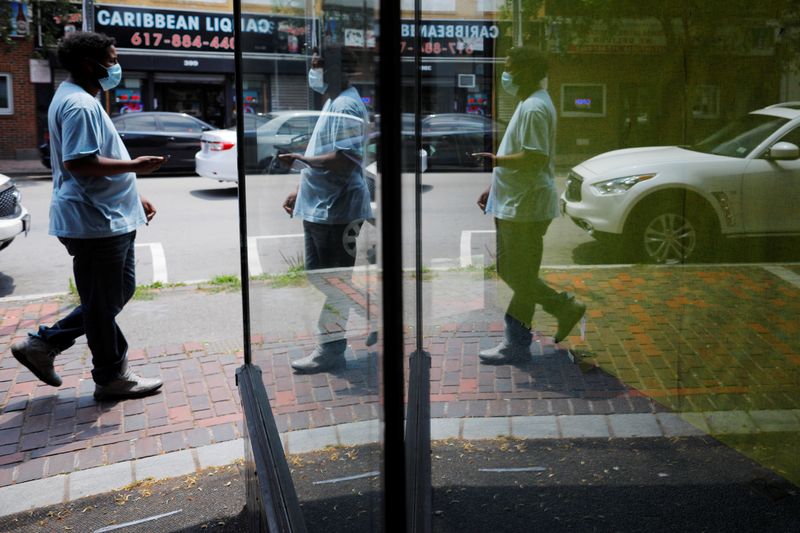By Howard Schneider
(Reuters) - U.S. states that have driven a record surge in coronavirus cases may now be slipping backward https://graphics.reuters.com/USA-ECONOMY/REOPEN/yxmpjlxewpr in their economic recovery, as cellphone data shows retail visits in a clutch of high case-growth locations falling below the rest of the country.
In Arizona, Texas, Florida, Georgia and South Carolina, which had edged ahead of other states during their drive in May to reopen commerce, retail foot traffic has slipped below levels elsewhere, information from data firm Unacast showed.
The data, which covers the period through July 3, is not representative of retail sales. But it does highlight the dilemma many economists and health experts have raised from the earliest days of the outbreak of novel coronavirus: Inattention to health protocols like wearing of masks and social distancing combined with a rush to reopen businesses could lead to worse outcomes for both public health and the economy.
"A mismanaged health crisis across many states means short-term gains will transform into medium-term sluggishness as social distancing relaxation is reversed and virus fear lingers," Gregory Daco, chief U.S. economist at Oxford Economics, wrote in an analysis on Thursday. "It's now evident that the economy is entering Q3 (third quarter) with much less momentum than previously anticipated."
Oxford's recovery https://graphics.reuters.com/USA-ECONOMY/OXFORDINDEX/xklvyzdwypg index fell for the second time in three weeks on the basis of a surge in COVID-19 cases that is straining hospital capacity in places like Texas as the hot spots of the outbreak rotate from states in the Northeast to those in the South and Southwest that resisted the strictest health measures early on. Several have since begun tightening rules or imposing restrictions they initially rejected.
The result is an economic reopening that appears to be, at best, in limbo, according to an array of high frequency data and broader analyses prepared by economists and the U.S. Federal Reserve.
Goldman Sachs (NYSE:GS) indexes https://graphics.reuters.com/USA-ECONOMY/GSTRACKERS/gjnpwwxnjpw of U.S. industrial and consumer activity both edged higher during the week ended July 4, while a New York Fed index https://graphics.reuters.com/USA-ECONOMY/WEI/bdwvkaebwvm of growth in gross domestic product edged down.
The drop in the New York Fed's index may be notable because it was driven lower by the components related to retail sales and consumer confidence, NatWest Markets analyst John Roberts wrote on Tuesday.
"It doesn’t seem like a great sign that retail sales and confidence fell in a week ending with a big U.S. holiday ... It does seem likely, however, that the spike in cases and increased lockdown measures in some hot-zone states would have negatively impacted confidence and sales, as was the case last week," he said.
Graphic: Retail foot traffic, % change vs. 2019 - https://graphics.reuters.com/USA-ECONOMY/REOPEN/qzjpqegogpx/chart.png
MAGNITUDE AND DURATION
Nationally, cellphone tracking data from both Unacast https://graphics.reuters.com/USA-ECONOMY/UNACAST/jznpnzkwkpl and Safegraph https://graphics.reuters.com/USA-ECONOMY/SAFEGRAPH/bdwvkaexwvm showed retail visits were stalled or falling. Time management firm Homebase https://graphics.reuters.com/USA-ECONOMY/HOMEBASE/ygdpzwdzmvw showed employment among its small business clients hit a plateau, while clients of Kronos https://graphics.reuters.com/USA-ECONOMY/KRONOS/xlbpgobqypq, which manages employee time across a larger swath of industries, showed a drop in shifts.
In each of those cases the outcome was likely influenced by business or shift closures over the July 4 holiday weekend.
Still, another 1.31 million people filed for unemployment https://graphics.reuters.com/USA-ECONOMY/REOPEN/jznvnzkdnvl insurance in the week ended July 4, and 32.9 million people were receiving unemployment checks under all programs in the third week of June.
Fed officials looking across that data and their own models have begun sounding a more pessimistic note. In appearances this week they cited renewed nervousness among business executives, a loss of "energy" among firms and consumers, and concern that a recovery that seemed to start fast in May and June may be facing a sort of crossroads as the United States tries to resolve the tension between the health and economic risks it is facing.
"We are uncertain about two things and that’s always hard. We are uncertain about the magnitude and we are uncertain about duration," of the twin crises, San Francisco Fed President Mary Daly said on Tuesday. "Being in a risk posture that says things can get worse, or can stay this bad for a while, is important I think for all of us."

For more details on the data referred to in this story: Unacast https://www.unacast.com/covid19/covid-19-retail-impact-scoreboard, Homebase https://joinhomebase.com/data/covid-19, Safegraph https://www.safegraph.com/dashboard, Kronos https://www.kronos.com/about-us/newsroom/update-us-workforce-activity, NYFed https://www.newyorkfed.org/research/policy/weekly-economic-index, Goldman https://www.goldmansachs.com/insights/topics/covid-19.html, Oxford https://www.oxfordeconomics.com, DOL https://oui.doleta.gov/unemploy/DataDashboard.asp
